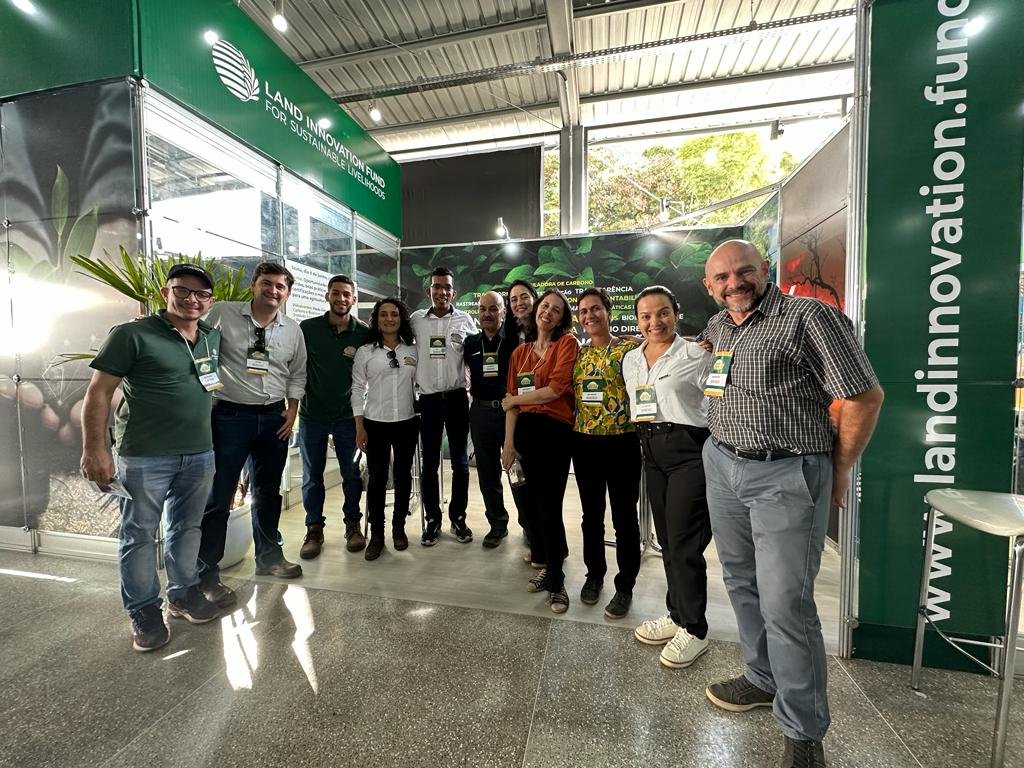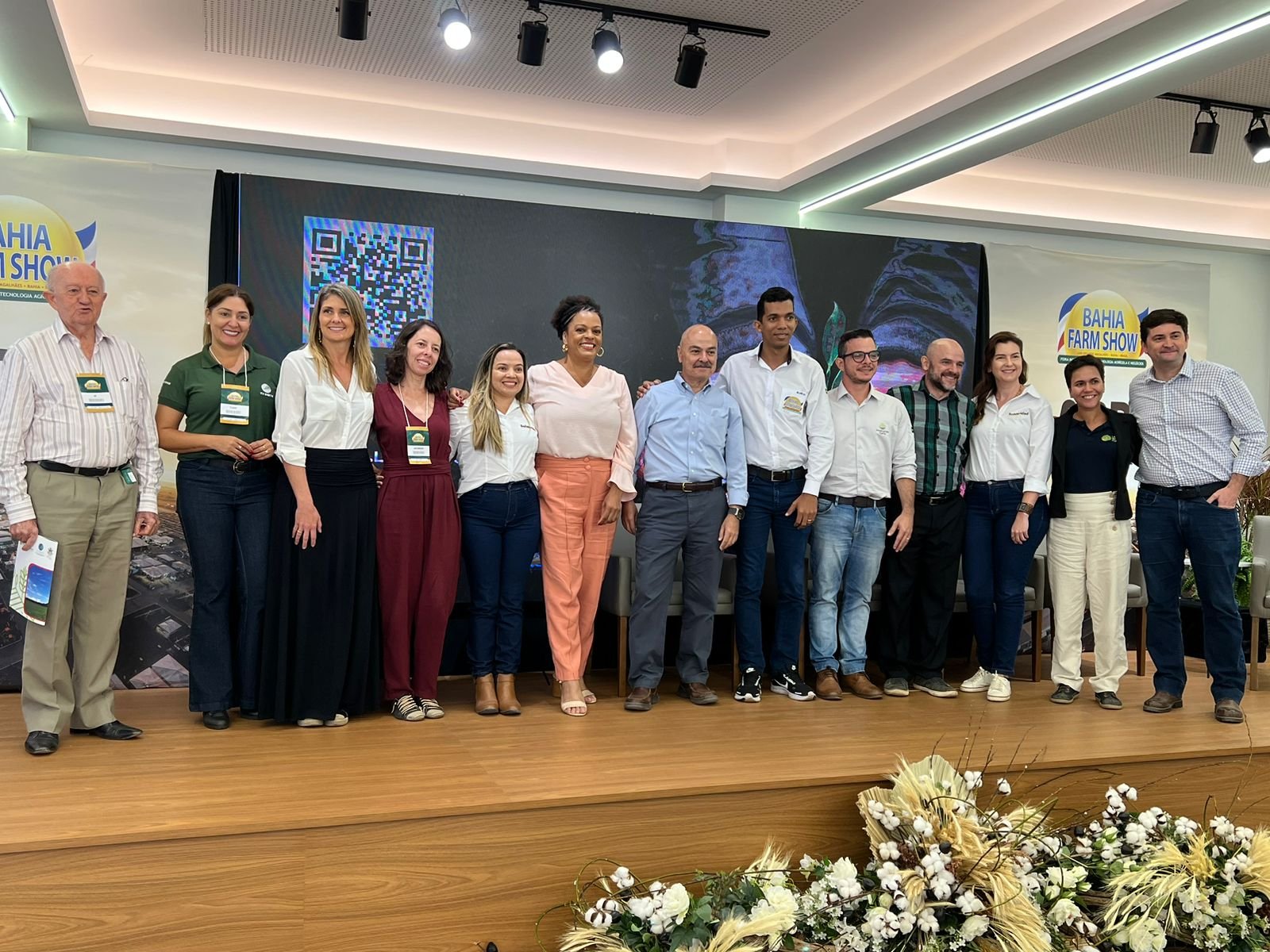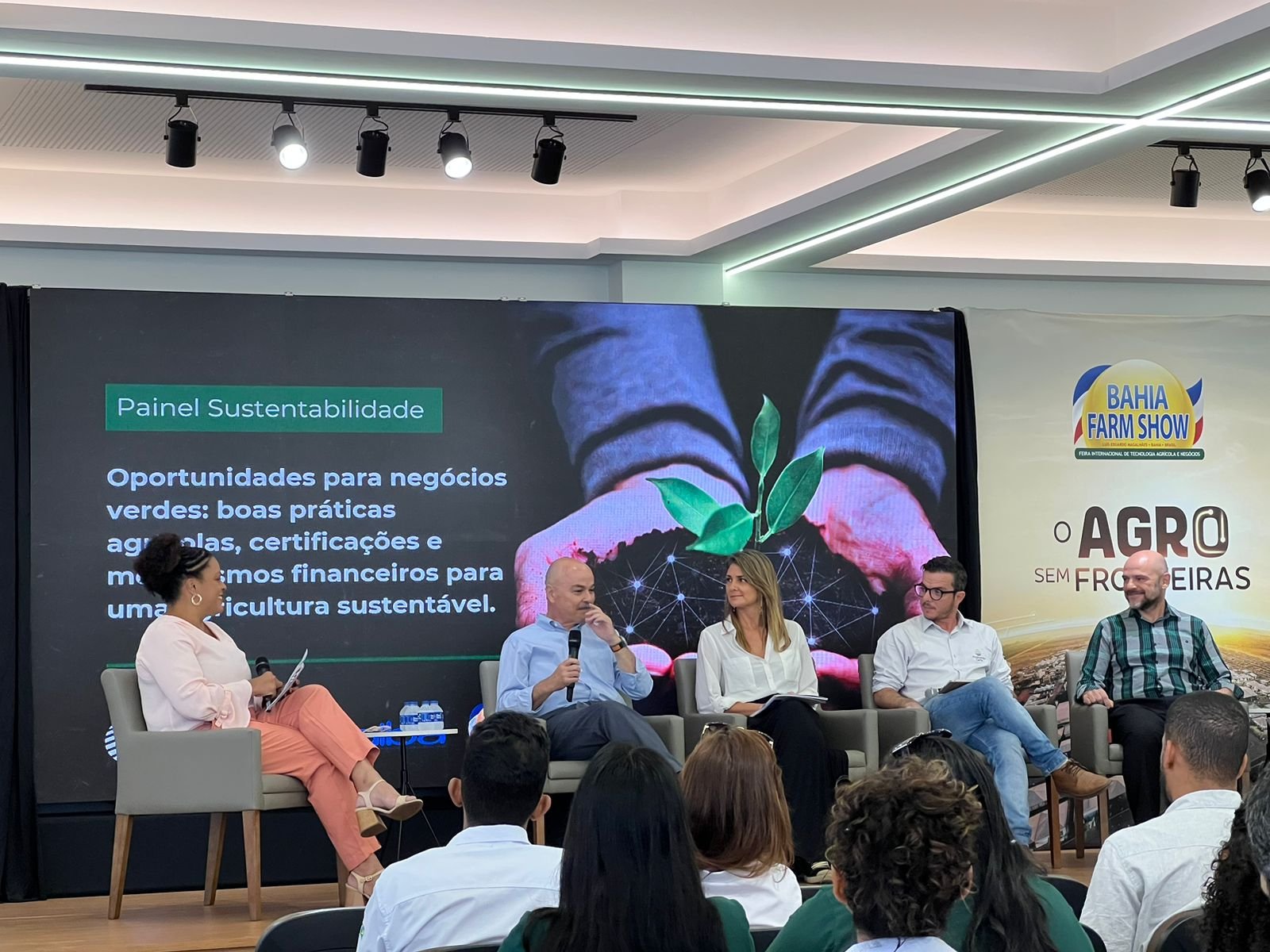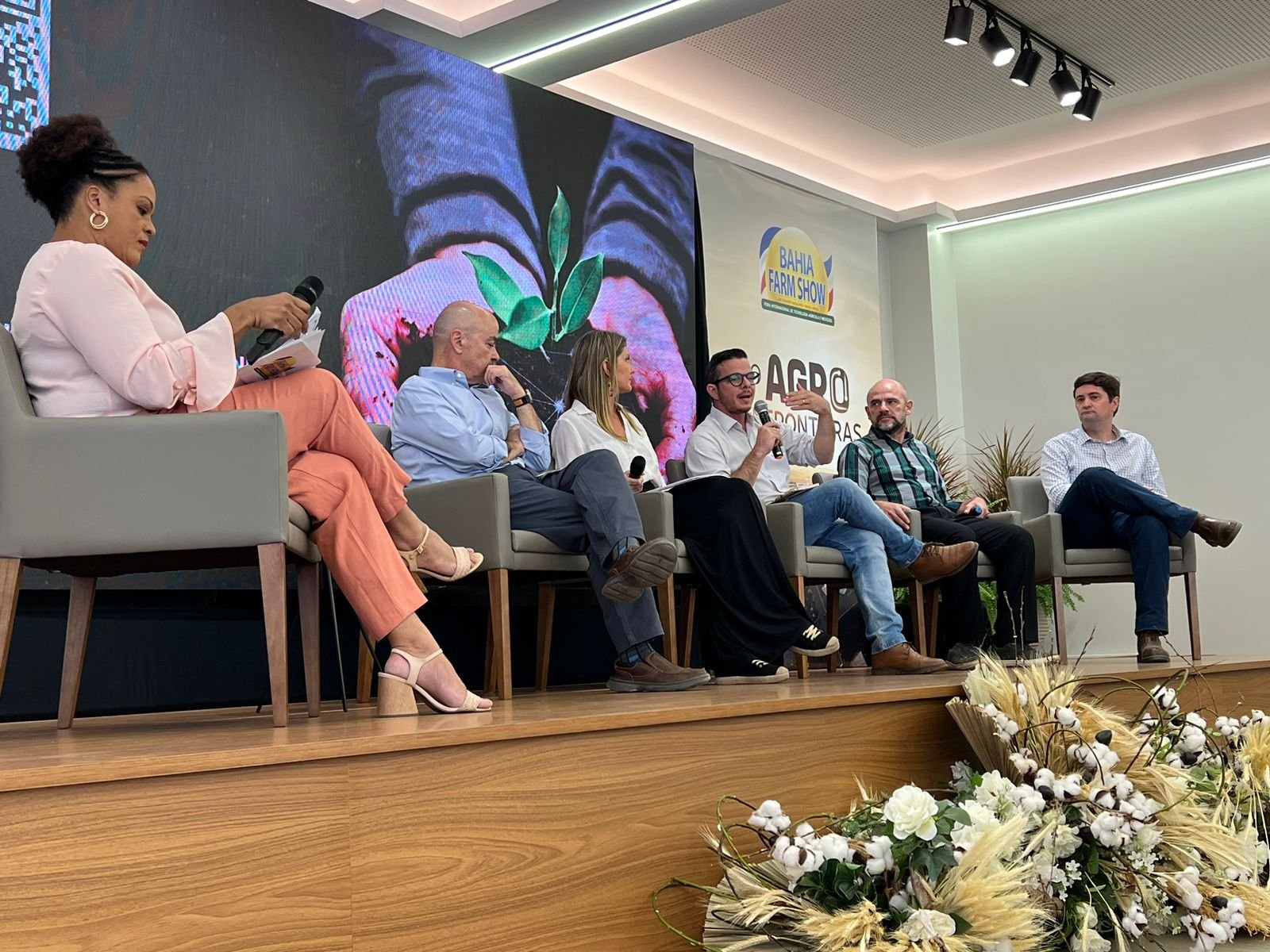Bahia Farm Show debates sustainability
The Land Innovation Fund and several partners discussed ways to promote responsible, low-carbon agriculture during a panel on sustainability at the largest agricultural fair in North and Northeastern Brazil.
Green business opportunities for sustainable agribusiness were on the table for discussion at the Bahia Farm Show on Friday, June 9. For a discussion sponsored by the Association of Farmers and Irrigators of Bahia (AIBA) and broadcast live on G1, the director of the Land Innovation Fund, Carlos E. Quintela, was joined by Paulo Zanardi Jr (GSS Carbon and Bioinnovation), Fernanda Gomes (Center for Sustainability Science at PUC-RJ and International Institute for Sustainability) and Diego Pedr'Angelo (Produzindo Certo), who are partners of the Fund in developing innovative solutions for sustainable, low-carbon agriculture in South America. The event was mediated by journalist Georgina Maynard, from TV Oeste. With the support of the Association of Farmers and Irrigators (AIBA), the Land Innovation Fund also welcomed partners, researchers, entrepreneurs, and farmers in its booth, to share knowledge and synergies among many projects and players throughout one of Brazil’s highest yield soy chains.
Carlos E. Quintela opened the event highlighting the Land Innovation Fund's catalytic role in building an innovative landscape for sustainability in the field. "We want to create conditions for sustainable development by eliminating technological, governance and business barriers, bringing partners together and enabling synergies to provide innovative solutions for sustainable, climate-smart agriculture. In a little over two years of work, the Land Innovation Fund has built a portfolio of 36 projects and 44 partners with initiatives concluded or underway in Brazil, Argentina, Paraguay, and Bolivia.
Overall, the solutions presented during the panel covered interrelated areas such as research and engagement with farmers (IIS), monitoring and certification of best agricultural practices (Produzindo Certo), measurement and marketing of carbon credits (GSS Carbono e Bioinovação), and biodiversity monitoring (Green Bug), all with a focus on farms and how to support farmers. "We know that complex challenges demand integrated and innovative solutions. That's why meetings and events like the Bahia Farm Show are so important for the Fund. We can create connections and enhance our dialogue with farmers", adds the director of the Fund.
Unity among agribusiness players, including researchers, landowners, and business – a cornerstone for the Land Innovation Fund – was another theme highlighted during the panel. The founder of GSS Carbono e Bioinovação and Treevia's partner in a project to measure and sell carbon credits for conserved areas, Paulo Zanardi Jr., highlighted the importance of working in partnership to enable projects with environmental assets. "We know that the cycle of a carbon project is long. We work to democratize access to technology and to the environmental assets market. Farmers can also work together to make it possible and easier for them to enter carbon markets", he explains.
At the event, Zanardi introduced Arbaro Carbon, an integrated innovation platform developed in partnership with Treevia with support from the Fund that combines technological development with the construction of technical, legal, and financial tools to improve the transparency and potential of environmental assets markets for forest conservation in Brazil. The initiative proposes to develop and manage carbon projects for conserved areas on farms during all the project's development phases – from measurement to marketing.



The importance of dialogue for the various members of the ag-supply chain was also highlighted by Fernanda Gomes, a researcher at PUC-Rio's Sustainability Center who led a behavioral science project applied to the soy chain, carried out by the International Institute for Sustainability with support from the Fund. At the event, she presented a sample of the survey of 60 farmers who own land suitable for conversion in the Matopiba region, to understand their criteria for decision-making on the opening of new productive areas. "We went to hear from the producers, and we were very well received. They were receptive and spoke about their fears, desires and challenges when making decisions in the field," she says. According to Fernanda, the farmers are united and share their impressions and knowledge with each other before making those decisions. "A farmer has access to information from local trade associations. They listen to the associations and to other farmers. Opening communication channels with farmers is fundamental for any transformation in the field.”
All agreed that best agricultural practices lead to more and better green business opportunities. The commercial coordinator at Produzindo Certo, Diego Pedr'Angelo, says that environmental certification helps raise funds from payments for environmental services. "Produzindo Certo offers tools and technical assistance that facilitate a farmer's access to sustainable agriculture markets." Specialized in technical assistance and sharing know-how on agricultural sustainability, Produzindo Certo recently launched the field data and evidence collection application "Eu coleto certo" and developed new functionalities for its socio-environmental diagnosis tool "Eu produzo certo", both of them developed and refined with support from the Land Innovation Fund to facilitate farmers' access to green business opportunities. "Sustainable agriculture should no longer be seen only romantically, but also from an economic standpoint," says Pedr'Angelo.
During the event, the CEO at the Green Bug startup, Marcelo Vieira, stressed the importance of its partnership with the Land Innovation Fund to develop an innovative solution. "With the Fund's help, we were able to take the project off the drawing board and turn it into results. Whether positive or negative, results are always favorable. We learn from mistakes to solve problems and to avoid repeating them. The Fund has given us the opportunity to do experiments and find innovative solutions to the problems we face."
Using the Internet of Things (IoT) and Artificial Intelligence (AI) to catalog sounds, transmit the results to a database, and monitor any noise changes in the mapped area, Green Bug is developing an acoustic monitoring platform to measure biodiversity on farms in the Cerrado. The startup was selected for funding by the Startup Finance Facility in the 3rd cycle of the Sustainable Soy for the Cerrado Program – a partnership between the Land Innovation Fund and AgTech Garage, with strategic support from the Brazilian Industrial Research and Innovation Corporation (Embrapii) and the Telecommunications Research and Development Center (CPQD) – as well as additional technical and financial resources from CPQD and Sebrae. With this tool, Green Bug also plans to detect changes in ecosystems, anticipate preventive actions as needed, and measure the scope of best agricultural practices, in order to enhance conditions both for production and for environmental conservation.
About the Land Innovation Fund (LIF):
Initially funded by Cargill and managed by Chemonics International, the Land Innovation Fund supports the design, development, and delivery of innovative solutions for sustainable and climate-smart agriculture, free from deforestation and conversion of native vegetation in three of South America's priority biomes: the Amazon, the Cerrado, and the Gran Chaco. Since its launch in January 2021, the Fund has supported 36 projects working with 44 partners in the region, engaging more than 1,400 farmers on an area covering approximately 1.8 million hectares.

